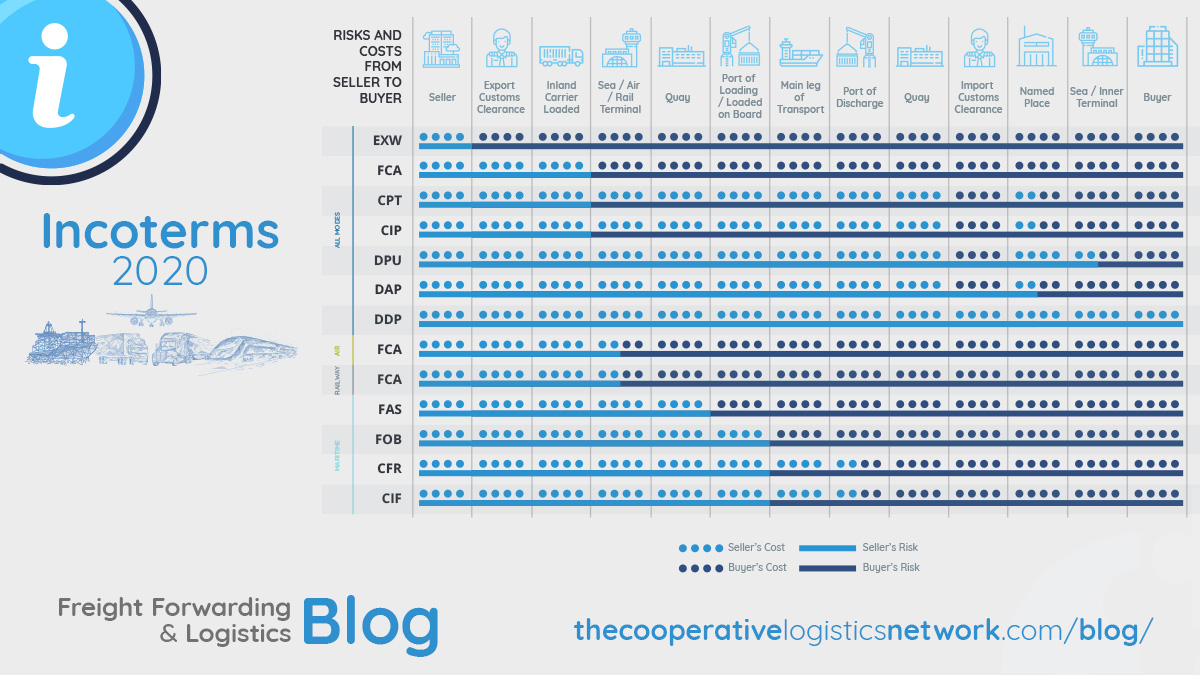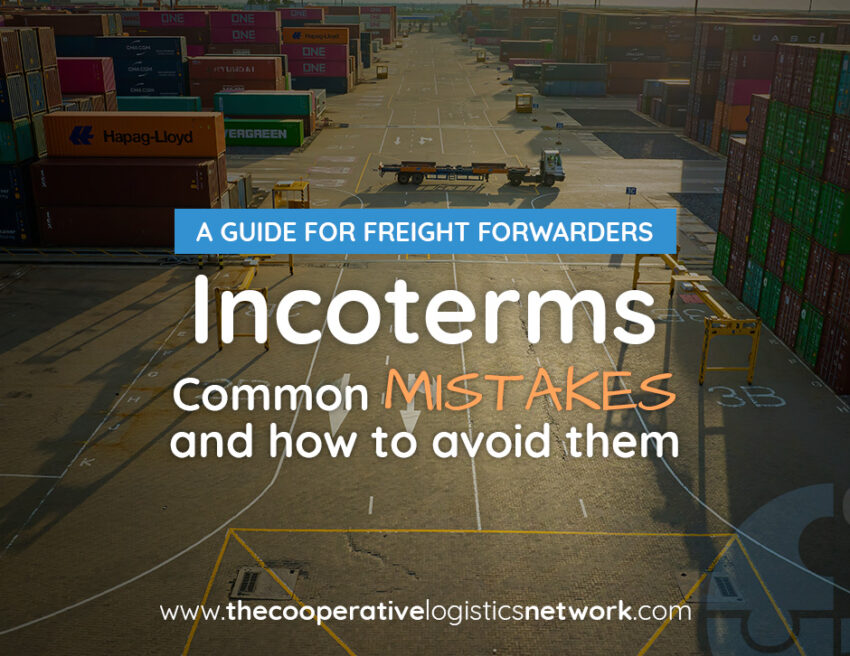In the complex world of global trade, Incoterms for freight forwarders are not just useful—they’re essential. These standardized trade terms, published by the International Chamber of Commerce (ICC), clearly define the responsibilities of buyers and sellers in an international transaction. They clarify who pays for shipping, who arranges insurance, who handles customs clearance, and where the risk transfers. Yet despite their importance, there are several Incoterms 2020 mistakes that freight forwarders continue to make.

Whether you’re an experienced professional or just starting in the logistics industry, avoiding these common Incoterms errors can save you time, money, and customer trust. In this blog, we’ll unpack where things usually go wrong and explain how to avoid Incoterms mistakes in logistics.
Mistake #1: Treating Incoterms as a Complete Contract
A major misconception is believing that Incoterms form a complete contract of sale. This is not the case. Incoterms only cover specific aspects of shipping—like transport, Incoterms shipping responsibilities, insurance, and delivery terms. They do not handle matters such as payment methods, transfer of ownership, penalties, or legal jurisdiction. Freight forwarders who assume that everything is settled by choosing a term like DDP or FOB often overlook crucial contract details that could create conflict between buyers and sellers.
How to avoid it:
Ensure your clients understand that Incoterms are only one piece of a broader sales agreement. Encourage them to consult legal professionals or use a standard sales contract that aligns with the Incoterm chosen.
Mistake #2: Using Outdated Terms Instead of Incoterms 2020
Many forwarders still rely on Incoterms from previous editions, like the 2010 or even the 2000 version. This creates problems because the definitions and obligations of some terms have changed. For example, DAT (Delivered at Terminal) was replaced in Incoterms 2020 by DPU (Delivered at Place Unloaded) to offer more flexibility in choosing delivery locations. Freight forwarders who continue to use outdated terms not only confuse their clients but may also expose themselves to legal risk if the parties interpret responsibilities differently.
How to avoid it:
Use the latest version—Incoterms 2020—and always specify it clearly in contracts and documentation. Saying “FOB (Incoterms 2020)” or “DAP (Incoterms 2020)” helps remove ambiguity.
Mistake #3: Choosing the Wrong Incoterms for the Mode of Transport
One of the most common Incoterms errors is selecting a term that doesn’t align with the chosen mode of transport. FOB, CFR, and CIF should only be used for ocean freight. Applying them to air freight or multimodal shipments is technically incorrect and can cause disputes over Incoterms shipping responsibilities.
For instance, using FOB for an air shipment makes no sense, as there is no ship’s rail where risk transfers. Similarly, choosing the right Incoterms for multimodal transport is essential when goods are shipped by truck, rail, and sea.
How to avoid it:
Stick with Incoterms designed for any mode of transport—such as FCA, CPT, CIP, DAP, DPU, and DDP—when shipping via air, rail, or multimodal routes.
Mistake #4: Misunderstanding Delivery vs. Risk Transfer
It’s easy to confuse the place of delivery with the point of risk transfer. But in Incoterms, these are not always the same. Take CIF, for example: the seller pays for transportation and insurance to the destination port, but the risk transfers to the buyer as soon as the goods are loaded on the ship at the origin port. This creates challenges during claims for cargo damage or loss, where the client may wrongly expect the seller (or you, the forwarder) to be responsible.
How to avoid it:
Make sure to explain to clients the difference between risk and delivery obligations under the Incoterms they select. Being clear here can prevent blame, disputes, and misunderstandings later.
Mistake #5: Not Specifying the Place of Delivery Clearly
Vague terms like “FOB China” or “CIF Europe” do more harm than good. Incoterms require a precise named place (port, terminal, warehouse, etc.) to determine where the transfer of responsibility happens. Not specifying the place can result in confusion or even legal conflict. For instance, “DAP Germany” leaves the final delivery point unclear—are the goods going to Hamburg port or a warehouse in Munich?
How to avoid it:
Always specify the complete delivery location: e.g., “DAP ABC Warehouse, Frankfurt, Germany (Incoterms 2020).” This minimizes ambiguity and ensures everyone’s on the same page.
Mistake #6: Failing to Educate Clients About Incoterms
Many forwarders assume their clients understand Incoterms well. But in reality, small and mid-sized importers/exporters may not grasp the implications of choosing one term over another. A client might select DDP because it “sounds easier,” without realizing they are responsible for Incoterms customs clearance in a foreign country, which they may not be licensed to do. This often leads to shipment delays or unexpected costs, damaging your credibility even if it’s not your fault.
How to avoid it:
Take time to educate clients. Explain which Incoterms are best suited to their shipment type, destination, and experience level. Offer examples. Being a knowledgeable partner builds long-term trust and positions you as more than just a transport provider.
Mistake #7: Taking on DDP Without Local Customs Support
DDP (Delivered Duty Paid) is one of the riskiest Incoterms for freight forwarders to manage because it requires the seller to handle import clearance and pay duties/taxes in the buyer’s country. Unless you have a local agent or customs broker in that country, you’re setting yourself up for delays and possible fines. Many forwarders accept DDP requests without considering whether the logistics chain includes support for import clearance at the destination.
How to avoid it:
Before accepting a DDP shipment, confirm that your client has the proper licenses or that you have a reliable agent in the destination country. If not, suggest using DAP (Delivered at Place), which avoids the import clearance obligation.
Conclusion: Incoterms Explained for Shipping Companies and Forwarders
At first glance, Incoterms may seem like dry legal jargon—but for freight forwarders, they are powerful tools that help define roles, reduce disputes, and keep international shipments on track. Misunderstanding or misusing them leads to frustration, liability, and financial losses.
By staying updated with Incoterms 2020, using the right terms for each transport mode, and communicating clearly with clients, freight forwarders can avoid the most frequent pitfalls. Most importantly, understanding Incoterms for freight forwarders helps you deliver smarter, faster, and more reliable logistics solutions.
So whether you’re handling ocean freight from Rotterdam or multimodal cargo from Shenzhen, remember: mastering Incoterms isn’t optional—it’s a competitive edge. Incoterms explained for shipping companies is more than a knowledge base; it’s a shield that protects your operations from costly surprises.


